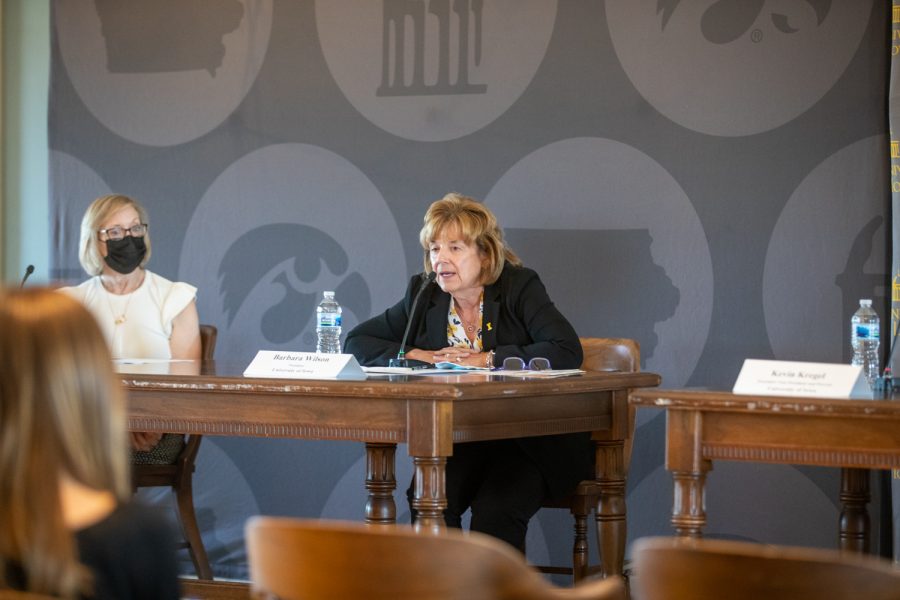Guest Opinion | Barbara Wilson is wrong; this is a political issue
UI COVID-19 policy is indeed a political issue that pits those in power vs. those who are not.
University of Iowa President Barbara Wilson speaks with media during a press conference at the Old Capitol in downtown Iowa City on Monday, Aug. 16.
August 22, 2021
“This isn’t a political issue. It’s a health issue,” University of Iowa President Barbara Wilson said at a COVID-19 media briefing on Aug. 16. This comes a few weeks after the Centers for Disease Control and Prevention released new guidelines that masks should be worn indoors by everyone, including vaccinated people, in counties labeled as “high” or “substantial” transmission –– a category Johnson County (alongside the majority of Iowa counties) falls into as of Aug. 16, prior to move-in week.
Wilson declares this distinction between health and politics in a response to a question about mask and vaccine mandates, measures currently being taken by other large schools but outlawed by Iowa Gov. Kim Reynolds, and thus merely “encouraged” by the UI.
But what does it mean for something to be a health issue, not a political issue? Who benefits from marking such a division?
The ‘political vs. health’ comment came before Wilson explained that if everyone would do their part and come together as a community, we can all have a great year. In other words, Wilson encourages us not to let our “political” differences divide us, but to instead realize we are “all in this together” to fight this “health issue.”
Her usage of the word “political” describes individual identity and belief. In this case, the “political” division is the conflict over whether to wear a mask and whether (if able) to get a vaccine. Wilson’s comment maps onto students and workers a division on these grounds: pro-mask/vaccine vs. anti-mask/vaccine. In this version of reality, Wilson and other administrators are the peacemakers, urging people on campus to overcome their “political” divisions for the sake of common health.
But this is a very narrow view of the word “political.” More broadly, this word describes systems of power that make decisions about how resources are allocated and what rules everyone must abide by.
This version of the word draws a different division. Instead of pitting students and workers against each other, it pits people on campus without institutional power (students and workers) against those with institutional power (administrators and the Board of Regents). In so few words, “political issues” are about policy and who has the power to make it. You, me, and all the other students and workers –– we have not had a say in these policies, and yet we are the ones affected by it.
Wilson is wrong: this is a political issue. But it is not in her interest to say so.
There are many policies that could be put in place right now to mitigate transmission and harm on campus and in this community –– a mask mandate; a vaccine mandate (for those whom it is medically advisable); options for online courses and employment; hazard pay for workers; internet stipends; decreased tuition and waived fees; among other things.
But these policies, while in the interest of students’ and workers’ health and safety, are not in the interest of the people making a profit off this university who have power over policy and whose cash flow relies on favorable ratings by creditors and high tuition rates.
In the most immediate time frame, this is a political issue because the people with local institutional power—like Wilson, other UI administrators, and the Board of Regents—have the power to prevent the next COVID-19 wave on campus and the illness and hardship that another pandemic semester will bring.
– Hannah Zadeh, University of Iowa Graduate Student



